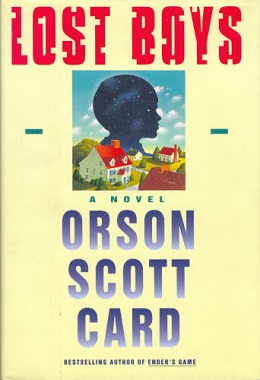
Lost Boys (1992) is a horror novel by American author Orson Scott Card. The premise of the novel revolves around the daily lives of a Mormon family, and the challenges they face after a move to North Carolina. The story primarily follows the family's troubles at work, church, and the oldest child Stevie's difficulty fitting in at school, which lead to him becoming increasingly withdrawn.

The Tales of Alvin Maker is a series of six alternate history fantasy novels written by American novelist Orson Scott Card, published from 1987 to 2003, with one more planned. They explore the experiences of a young man, Alvin Miller, who realizes he has incredible powers for creating and shaping things around him.

Seventh Son (1987) is an alternate history/fantasy novel by American writer Orson Scott Card. It is the first book in Card's The Tales of Alvin Maker series and is about Alvin Miller, the seventh son of a seventh son. Seventh Son won a Locus Award and was nominated for both the Hugo and World Fantasy Awards in 1988. Seventh sons have strong "knacks", and seventh sons of seventh sons are both extraordinarily rare and powerful. In fact, young Alvin appears to be the only one in the world. His abilities make him the target of the Unmaker, who recognizes Alvin's powers as those of a Maker, only the second ever, and it had been a long time since the first had walked on water and turned water to wine. The Unmaker works largely by water and tries to kill Alvin in his early years before he can master his abilities.

Enchantment is an English language fantasy novel by American writer Orson Scott Card. First published in 1999, the novel is based on the Ukrainian version of Sleeping Beauty and other folk tales. Various forms of magic, potions, and immortal deities also play an important role in the story.
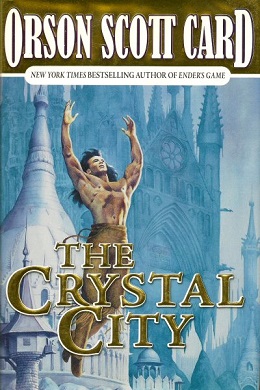
The Crystal City (2003) is an alternate history/fantasy novel by American writer Orson Scott Card. It is the sixth book in Card's The Tales of Alvin Maker series and is about Alvin Miller, the seventh son of a seventh son.

Red Prophet (1988) is an alternate history/fantasy novel by American writer Orson Scott Card. It is the second book in Card's The Tales of Alvin Maker series and is about Alvin Miller, the seventh son of a seventh son. Red Prophet won the Locus Award for Best Fantasy Novel in 1989, was nominated for the Nebula Award for Best Novel in 1988, and the Hugo Award for Best Novel in 1989.
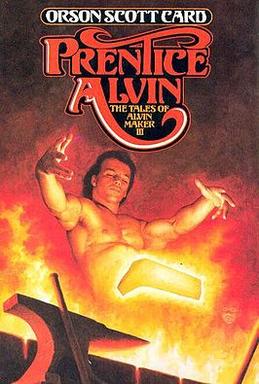
Prentice Alvin (1989) is an alternate history/fantasy novel by American writer Orson Scott Card. It is the third book in Card's The Tales of Alvin Maker series and is about Alvin Miller, the seventh son of a seventh son. Prentice Alvin won the Locus Award for Best Fantasy Novel in 1990, was nominated for the Nebula Award for Best Novel in 1989, and the Hugo Award for Best Novel in 1990.

Heartfire (1998) is an alternate history/fantasy novel by American writer Orson Scott Card. It is the fifth book in Card's The Tales of Alvin Maker series and is about Alvin Miller, the seventh son of a seventh son. Heartfire was nominated for the Locus Award in 1999.

Shadows in Flight is a science fiction novella by American writer Orson Scott Card. When released in 2012, it became the twelfth book published in the Ender's Game series. The story follows on from where the original four "Shadow series" books left off. It is about Bean and his children discovering an ancient Formic "ark" during their journey in space. It was released in January of 2012. It was nominated for the Goodreads Choice Award for science fiction.

Lovelock is a 1994 science fiction novel by American writers Orson Scott Card and Kathryn H. Kidd. The novel's eponymous narrator, a sentient monkey, takes his name from James Lovelock, the scientist-inventor who formulated the Gaia hypothesis, which figures heavily in the book.
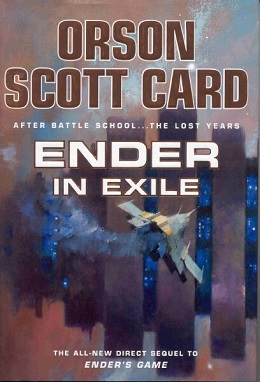
Ender in Exile is a science fiction novel by American writer Orson Scott Card, part of the Ender's Game series, published on November 11, 2008. It takes place between the two award-winning novels Ender's Game and Speaker for the Dead. It could also be considered a parallel novel to the first three sequels in the Shadow Saga, since the entirety of this trilogy takes place in the span of Ender in Exile. The novel concludes a dangling story line of the Shadow Saga, while it makes several references to events that take place during the Shadow Saga. From yet another perspective, the novel expands the last chapter of the original novel Ender's Game. On the one hand, it fills the gap right before the last chapter, and on the other hand, it fills the gap between the last chapter and the original (first) sequel. Ender in Exile begins one year after Ender has won the bugger war, and begins with the short story "Ender's Homecoming" from Card's webzine Intergalactic Medicine Show. Other short stories that were published elsewhere are included as chapters of the novel.
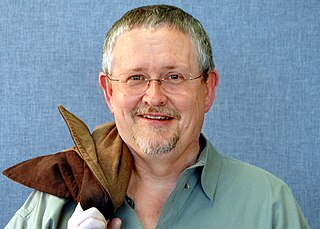
Orson Scott Card is an American writer known best for his science fiction works. He is the first and only person to win both a Hugo Award and a Nebula Award in consecutive years, winning both awards for both his novel Ender's Game (1985) and its sequel Speaker for the Dead (1986). A feature film adaptation of Ender's Game, which Card co-produced, was released in 2013. Card also wrote the Locus Fantasy Award-winning series The Tales of Alvin Maker (1987–2003).
The Orson Scott Card bibliography contains a list of works published by Orson Scott Card.
"Prentice Alvin and the No-Good Plow" is a poem by Orson Scott Card. The poem was the basis for Card's The Tales of Alvin Maker series.
"Gert Fram" is a short story that by American author Orson Scott Card. It appears in his short story collection Maps in a Mirror, but it originally appeared in the July 1977 fine arts issue of Ensign magazine under the pen name Byron Walley. It is Card's first published work.

Red Prophet: The Tales of Alvin Maker is a twelve-issue comic book limited series by Orson Scott Card, based on Card's The Tales of Alvin Maker novel series. Publication started in March 2006 by Dabel Brothers Productions and was finished in 2008 by Marvel Comics.
Ender's Game is a series of comic book adaptations of a series of science fiction novels of the same name written by Orson Scott Card and published by Marvel Comics that began in October 2008. However, some have new content never before released in the novels. The series, like the novels they are based on, is set in a future where mankind is facing annihilation by an aggressive alien society, an insect-like race known colloquially as "Buggers" but more formally as "Formics". The central character, Andrew "Ender" Wiggin, is one of the child soldiers trained at Battle School to be the future leaders of the protection of Earth. The year is never specified, although the ages of the Wiggin children are bound to change throughout space, taking in the relativity of space and time.
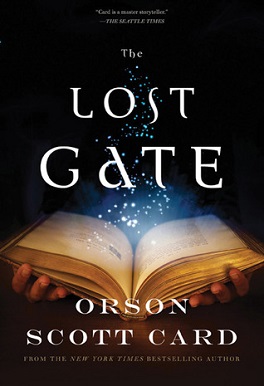
The Lost Gate is a fantasy novel by Orson Scott Card. It is the first novel in the Mither Mages trilogy. The second novel is The Gate Thief and the third one is Gatefather.
The Pathfinder series is a completed series of novels by Orson Scott Card that is notable for its unusual fusion of the themes of science fiction and fantasy, with some elements of historical fiction. One significant aspect of the Pathfinder series is its uniquely complex but well documented set of time travel rules.
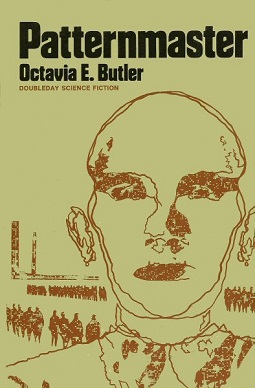
Patternmaster (1976) is a science fiction novel by American author Octavia E. Butler. Patternmaster, the first book to be published but the last in the series' internal chronology, depicts a distant future where the human race has been sharply divided into the dominant Patternists, their enemies the "diseased" and animalistic Clayarks, and the enslaved human mutes. The Patternists, bred for intelligence and psychic abilities, are networked telepaths. They are ruled by the most powerful telepath, known as the Patternmaster. Patternmaster tells the coming-of-age story of Teray, a young Patternist who learns he is a son of the Patternmaster. Teray fights for position within Patternist society and eventually for the role of Patternmaster.














